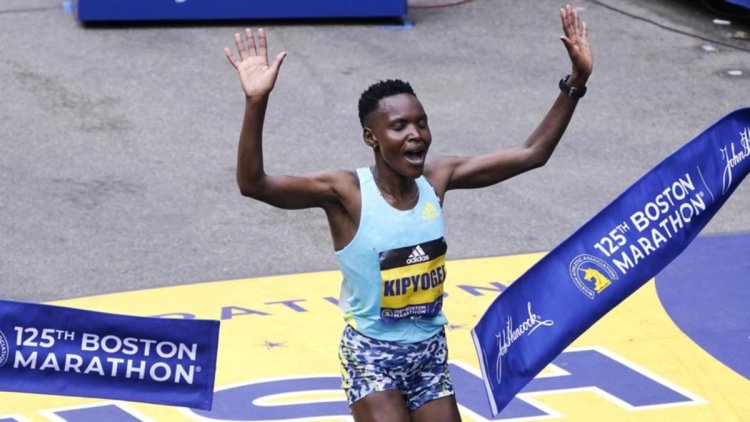Agent claims suspended Boston Marathon winner is guilty
She has also been charged with "obstructing or delaying the AIU's investigation through the provision of false information or documentation".

The agent of suspended Boston Marathon winner Diana Kipyokei has alleged she is "completely guilty" after her provisional sanction by the Athletics Integrity Unit (AIU).
Kenya's Kipyokei won the women's race in Boston last year but failed a drugs test for triamcinolone immediately afterwards.
She has also been charged with "obstructing or delaying the AIU's investigation through the provision of false information or documentation".
Both Kipyokei and fellow Kenyan marathon runner Betty Wilson Lempus - who has been charged with tampering a probe into her own failed triamcinolone test - are represented by Italian Gianni Demadonna.
He told LetsRun: "We establish a policy - they have to tell us every time they take a medicine.
"If they don't tell us, they are guilty.
"What can I do?
"I cannot stay with the athletes.
"I cannot live with them.
"After 30 years, I am working this business and nobody can say to me 'you are not correct or you are doing things that are not correct'.
"I can defend myself always without any problem.
"I am so, so sad about this situation that spoiled my name and spoiled the name of [clean] athletes that are doing their own training - not with something else."
Demadonna added that 28-year-old Kipyokei, whose surname has also been spelt Kipyogei, told him a doctor had prescribed her triamcinolone but that her story was inconsistent.
"She never said to us the real name of the doctor," he said.
"I don't know if she's afraid of consequences.
"But as far as we understood, she was trying to cheat us.
"She gave us some stories, and we said, 'sorry, but you changed three times the name of the doctor'.
"Diana is completely guilty.
"I am sorry.
"She has done something very bad."
The AIU said that Kipyokei would be disqualified as Boston Marathon champion if the allegations against her are proven.
Her case will be heard and she will also have the right to appeal.
Kipyokei won the race, one of the World Marathon Majors, in 2 hours 24min 45sec on October 11 last year, beating fellow Kenyan and two-time world marathon champion Edna Kiplagat into second place.
"The Boston Athletic Association (BAA) has received the Athletics Integrity Unit findings in regards to Diana Kipyokei," a statement from race organisers said.
"As a result of the AIU findings and in conformance with World Athletics and BAA event rules, Kipyokei's result in the 2021 Boston Marathon will be disqualified, pending the completion of relevant athlete appeals processes.
"The Boston Athletic Association supports strict anti-doping measures to ensure fair competition and clean sport.
"Athletes in the professional divisions at the Boston Marathon are tested in accordance with the guidelines set forth by World Athletics, the World Anti-Doping Agency, and the United States Anti-Doping Agency.
"The BAA is committed to providing a fair environment for competition and supports all measures that ensure the integrity of the sport.
"The BAA will adjust race rankings and will provide prize award adjustments to top finishers of the 2021 event, pending the sanctioning."
Triamcinolone, a type of steroid, is usually used to treat skin conditions and rheumatic disorders and is included on the World Anti-Doping Agency banned list.
It has become a problem substance in Kenyan athletics as 10 athletes tested positive between 2021 and this year.
The AIU said that in the same period globally, only two athletes from other countries had failed a test for triamcinolone.
Only three Kenyans tested positive between 2017 and 2020, suggesting a growing trend.
Mark Kangogo, a Kenyan who won the Sierre-Zinal 2022 mountain race in Switzerland, was last week banned for three years after triamcinolone was detected in his sample.
Four other cases involving Kenyans and the substance are currently ongoing at the AIU.
Athletes can obtain a therapeutic use exemption to take triamcinolone, which has been at the centre of some big stories in cycling.
Lance Armstrong and David Millar, who both served high-profile doping bans, both admitted to taking it.




















